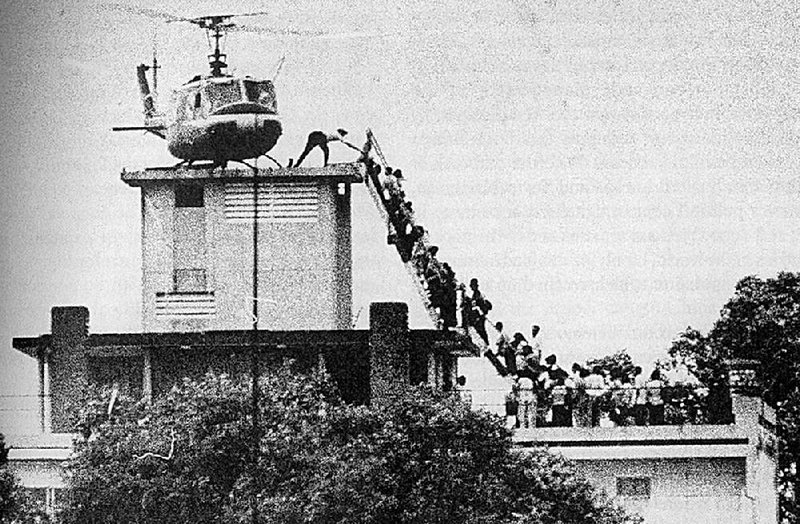On the 40th anniversary of the American humiliation in Vietnam, there was no escaping the flashbacks. The grainy images resurrected on television, in the papers, in the recesses of American memory . . . . It was all brought to agonizing life again. Bright, glaring, painful. You wanted to shield your eyes. The mercifully forgotten voices of beleaguered American presidents, all-knowing U.S. senators, savvy war correspondents, the screams and laments . . . they were back with us after all these years. And the din was as unbearable as it was inescapable.
Once again chaos descended as desperate Vietnamese fought to leap aboard the last helicopter lifting off from the roof of the American embassy in what was then Saigon, Republic of Vietnam, and would soon enough be history. Now merciless, inescapable history was back--with a vengeance only memory can exact. The old, nightmarish scenes seemed all around in this age of 24/7 media coverage, new again, reminders of not just what had happened 40 years ago but what is happening now. For the lesson is being repeated all over the world: When this country retreats, terror and tyranny advance, filling the vacuum left as American power, along with American idealism, withdraws.
Once again American troops are no longer there to deter the world's evil empires, and they move to exploit America's absence. If you seek confirmation of that same old, repeated pattern, just look around. At the Middle East, eastern Europe, the Pacific rim . . . . It happens whenever American isolationism becomes newly popular: Peace is no longer considered worth the sacrifices required to maintain it. So the violent bear it away. It'll happen every time. It is happening today.
What was the worst prediction by those supposedly in the know 40 years ago--the war correspondents decked out in their bush jackets and conventional knowledge? At the time, the never very stable regimes of Southeast Asia--Vietnam, Cambodia, Laos--were falling one by one, like so many dominoes in a row. That's when Sydney Schanberg's dispatch arrived a few days before the fall of Phnom Penh, the Cambodian capital, with the assuring news that, for the "ordinary people of Indochina . . . it is difficult to imagine how their lives could be anything but better with the Americans gone."
No Americans, no war, no suffering. Happy days were here again. As the New York Times headlined its correspondent's report: "Indochina without Americans/ For Most, a Better Life."--April 13, 1975. Give 'em a happy ending every time. The byline might as well have been Pollyanna instead of Sydney Schanberg.
Forget all those warnings about the bloodbath that was sure to follow in the Americans' wake as the Communists seized control of these little nations and proceeded to act like . . . Communists.
Mr. Schanberg was scarcely alone in his blithe optimism: "Some will find the whole bloodbath debate unreal. What future possibility could be more terrible than the reality of what is happening in Cambodia now?"--Anthony Lewis in the New York Times, March 17, 1975.
"The evidence is that in Cambodia the much heralded bloodbath that was supposed to follow the fall of Phnom Penh has not taken place."--The Nation, June 14, 1975, even as the bloodbath was taking place.
As the mass executions began, Sydney Schanberg was still assuring his readers that "none of this will apparently bear any resemblance to the mass executions that had been expected by many Westerners." But even 40 years later, it is still uncertain how many innocent millions were slaughtered in Cambodia's notorious killing fields; it's estimated that a quarter to a third of the country's population was done to death. Anyone who wore spectacles (a sure sign of a dangerous reactionary who read too much) was legitimate prey--a class enemy asking to be worked to death. Or just summarily shot.
It was left to George W. Bush, called on to commemorate these sad events years later in an address to the Veterans of Foreign Wars, to face up to consequences of American defeat and flight: "The tragedy of Vietnam is too large to be contained in one speech," he acknowledged. "So I'm going to limit myself to one argument that has particular significance today. Then as now, people argued the real problem was America's presence and that if we would just withdraw, the killing would end." Instead, he pointed out, "the price of America's withdrawal was paid by millions of innocent citizens whose agonies would add to our vocabulary new terms like 'boat people,' 're-education camps,' and killing 'fields.'"
It was another Republican, a president named Lincoln, who said it: "Fellow-citizens, we cannot escape history. We . . . will be remembered in spite of ourselves." And so we will be. And so we were this week.
Editorial on 04/30/2015
